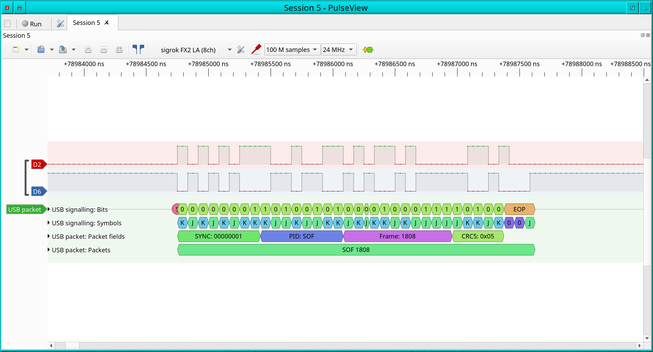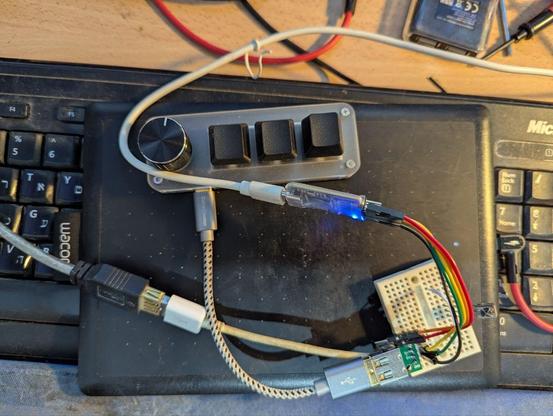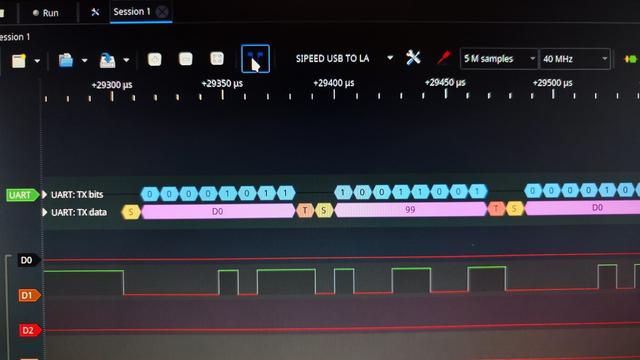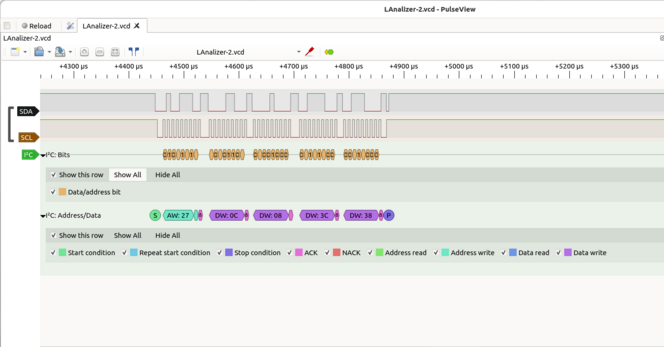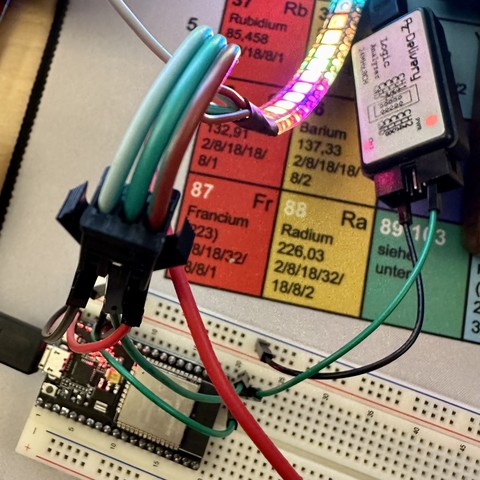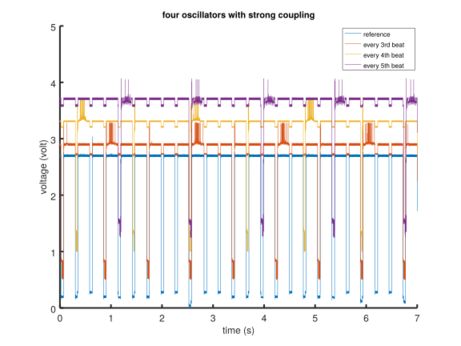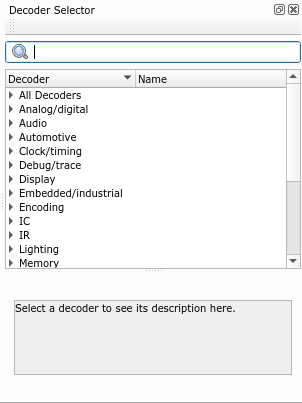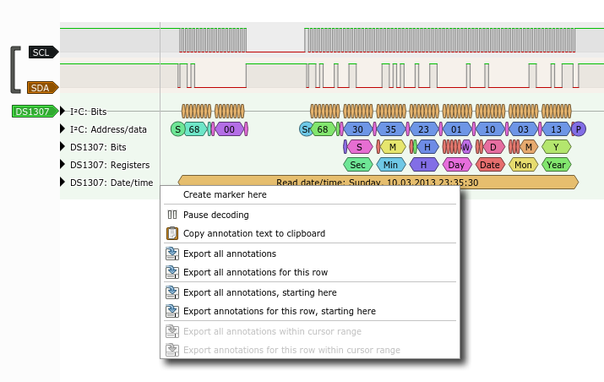First time I'm playing around with sniffing USB traffic with a 5 USD, 24 MBit/s logic analyser from AliExpress connected to my desktop running #pulseview. Now I have to figure out what to do with the acquired data.
#PulseView
Pausing the project here for a bit. With seven pins dedicated to reading a #SEGA controller, I can use the 8th pin as a signal from the #Arduino not just to indicate when a certain thing is happening, but also as a trigger in #PulseView to start capturing data.
Are you an Arduino/generally a microcontroller or electronics hobbyist? You should go buy a #nanoDLA logic analyser - for a few bucks you can easily visualise exactly what's going on with your I/O signals. Solid recommendation from me.
Six days later, a #nanoDLA 1.3 has arrived. It cost me AU$10.54 including postage. It's an open source logic analyser, documentation in English here: https://github.com/wuxx/nanoDLA/blob/master/README_en.md
This thread will document my first explorative experiences with it and sigrok's #PulseView, an open source logic analyser software package and the recommended counterpart to the nanoDLA: https://sigrok.org/wiki/PulseView
Инфракрасный хакинг: взламываем пульт от телевизора Samsung
При обсуждении взлома оборудования не стоит забывать о старой, но по-прежнему распространенной технологии передачи данных — инфракрасных сигналах. Они до сих пор используются в наших домах, офисах и даже на производстве. Этот способ связи имеет свои недостатки: ограниченную дальность, чувствительность к внешнему освещению, невысокую скорость передачи данных, а также уязвимость к перехвату и атакам, включая повторное воспроизведение сигналов. С другой стороны, он дешев в производстве и прост в применении, а еще он обеспечивает долгую работу пультов управления от батареек, ведь потребляет электричество только во время работы. В статье поговорим о реверс-инжиниринге и аппаратном хакинге протоколов дистанционного ИК-управления: от подготовки необходимого оборудования до перехвата и декодирования сигналов. Взломаем пульт от телевизора Samsung и поделимся библиотекой ИК-сигналов, которая позволит вам с легкостью декодировать передачи для других устройств — например, камина Electrolux и кондиционера Funai.
https://habr.com/ru/companies/bastion/articles/888176/
#реверсинжиниринг #взлом_твпульта #перехват_инфракрасных_пультов #Logic_2 #PulseView #аппаратный_хакинг #перехват_иксигналов #библиотека_ИКсигналов #инфракрасный_хакинг #декодирование_ИКсигналов
Neuer Blogpost zu Nutzung von #Logic-Analyzern und der Software #PulseView, um einen Hardware-Bus wie #I2C, #SPI oder #UART zu belauschen. Wenn bei #IoT-Geräten mit Sensorik und Aktorik herausgefunden werden muss, ob der Fehler Software oder Hardware betrifft, entpuppen sich günstige #Logic-Analyzer mit dem #OpenSource Programm #PulseView als wahre Tausendsassa. Einstieg, die Protokollanalyse folgt in späterem Artikel https://oer-informatik.de/logicanalyzer #elektronik #arduino #microcontroller
Вот так выглядит пачка битов в #tx_bits (сверху 0 и 1) из источника и сигнал начала передачи первой пачки "S" т.е. Start bit (логический 0), далее D0 в hex коде, и завершающий бит "T" т.е. sTop bit (логическая 1) в #tx_data потом следующая пачка битов. Итого два байта D0 и 99, которые вместе соответствуют кириллическому символу "Й" в кодировке UTF-8. Вот и получаем на выходе сообщение:
"Йоу, собаки!"
"Я - Наруто Узумаки!"
:ninja: фау-яу, ки-и-ия!
#embedded
#linux
#stm32
#stm32f407vgt6
#slogic
#PulseView
#uart
#rx_tx
#utf8
Connecting to a DS1307 clock chip over I²C
https://makertube.net/videos/watch/dba84154-78f6-40ac-8b3f-6f22f637eea2
Flashing an ARM chip using SWD, FT232H and OpenOCD
https://makertube.net/videos/watch/7fc52275-6e58-4c3a-bf42-a43967203617
Passando o a manhã de domingo decodificando dados com protocolo i2c, já que não posso pedalar, porque a dengue acabou com o meu condicionamento físico 😅 . com o #pulseview, aplicação sensacional para usar com analizadores lógicos.
Okay, I know how to reverse engineer the WS2812 protocol that WLED speaks to an RGB LED strip with my logic analyzer. But all I get is color codes. Where are the command or addressing parts? How can I find those in an acquisition? Still learning „how to logic analyze“. Ben Eater to the rescue! 😂 #electronics #ws2812 #wled #logicanalyzer #esp32 #sigrok #pulseview #BenEater
Logic Analyzers: Tapping Into Raspberry Pi Secrets https://hackaday.com/2023/08/31/logic-analyzers-tapping-into-raspberry-pi-secrets/ #HackadayColumns #logicanalyser #logicanalyzer #raspberrypi #pulseview #sigrok
#c64 hardware hackers: has any1 else successfully used the IEC decoder in #PulseView? It is very inconsistent, for me... #retrocomputing.
#FujiNet 4 #Commodore currently debugging low level bus handling. This is a test program in BASIC that gets adapter info one line at a time. Using #pulseview to determine where the fault is happening, and a test program.
Spent weekend learning about rectifier circuits with so much theory. Ended the day with #DHT11 and logic analyzer hooked up to #PulseView and #Pico #RaspberryPi Temperature is 691.5 ℃ but 28 ℃ on console so work to be done.
Need A Logic Analyzer? Use Your Pico!
There's a slew of hardware hacker problems that a logic analyzer is in a perfect position to solve. Whether you're trying to understand why an SPI LCD screen doesn't initialize, what's up with your I2C bus, or determine the speed of an UART connection, you'll really want to have a logic analyzer on hand. People have been using a Pi Pico as a logic analyzer in a pinch, and now [pico-coder] has shared a sigrok driver that adds proper support for a Pico to beloved tools like Pulseview.
The specs offered are impressive. Compared to the $10 "Saleae" clone analyzers we are so used to, this thing boasts 21 digital channels with up to 120 MHz capture speed, 3 ADC channels at up to 500 KHz, and hardware-based triggers. The GitHub repository linked above stores the driver files out-of-tree, but provides build instructions together with an easily flash-able uf2 firmware. It's likely that you'll soon see this driver in a stock Pulseview installation, however, given the submitter-friendly attitude we've witnessed on the sigrok mailing list. However, if you need a logic analyzer ASAP, you should follow the caringly offered quickstart guide.
We've covered Pulseview being used in combination with cheap accessible analyzers before -- a must-watch if you need to get yourself up to speed on the value they provide to a hobbyist. If an oscilloscope is what you need and a smartphone is what you have, perhaps you'll enjoy the Scoppy firmware for the Pico.
We thank [mip] for sharing this with us!
#raspberrypi #toolhacks #logicanalyzer #pipico #pico #pulseview #raspberrypipico #sigrok
electronic junk show // low-commentary, late 90s embedded // 2021-10-09 https://diode.zone/videos/watch/563beac0-09e9-4fe6-9ee9-936c7006ea00
Working on a paper submission for the #nime2021 conference and enjoying the power of octave (https://www.gnu.org/software/octave/index) for creating plots from oscilloscope recordings using pulseview (https://sigrok.org/wiki/PulseView). Listen to it here https://soundcloud.com/fblchrstn/strong-coupling?in=fblchrstn/sets/polyrhythmic-explorations.
#octave, #pulseview, #polyrhythm
Flashing an ARM chip using SWD, FT232H and OpenOCD https://diode.zone/videos/watch/9769d70f-6447-42a0-a51d-1f2df3cf370e
#PulseView 0.4.2 released! Lots of new features, e.g. saving session setups, GUI translations, easier decoder selection, decoder annotation filtering/hiding, "binary" (WAV, PNG, PCAP) decoder output view, handy key shortcuts, tons of bugfixes.
Recent #PulseView features you might have missed: annotation export in various formats (printf-style spec), protocol decoder subwindow which allows nicer PD selection and stacking.
https://www.sigrok.org/blog/pulseview-features-you-might-have-missed
